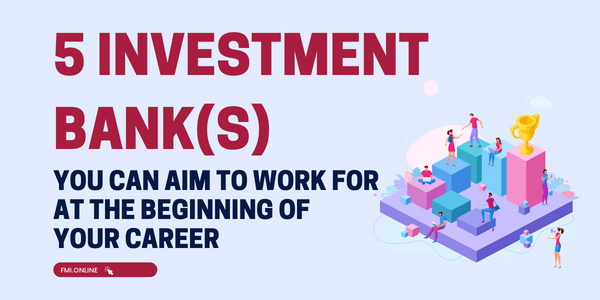A degree in finance, economics, or accounting is a prerequisite for certain banking, asset management, or insurance industry jobs. These degrees demonstrate technical proficiency in skills such as financial modeling or derivatives valuation.
On their own, however, these degrees are less likely to demonstrate other skills required for success in almost any professional role, such as communication skills, problem-solving ability, and resilience.
Many people who do not have a related degree, want to enter the finance industry. Perhaps they are graduates with domain-specific knowledge such as computer science or maths and statistics. Maybe they are experienced professionals from a Human Resources or Marketing background that want to change industries.
Every bank or asset manager wants motivated employees with strong interpersonal skills coupled with outstanding communication abilities.
The following are five ways to demonstrate to potential employers that you possess the skills they desire in an employee and the passion necessary for a successful career in finance.
We created the list in order, from the easiest to achieve, both from a time and cost commitment perspective, to the hardest.
1. Learn the language
If you are passionate about a finance career, you need to go into interviews feeling comfortable using and applying the correct terminology. You should know the difference between a stock and a swap and what terms like DCF stand for.
Learning financial terms and concepts can be achieved by reading the financial press like The Financial Times or browsing the free resources found at Fmi.online.
2. Learn through simulations
Several websites—including Fmi.online—have simulations that allow you to learn through an experiential approach.
Some simulations allow you to construct portfolios (like the one in the Fmi Asset Management pathway), trade financial instruments (like the one in the Fmi Global Markets pathway), or be involved in the M&A industry (such as can be found in the Fmi Investment Banking pathway).
By stepping into the shoes of an asset manager, trader, or investment banker, you will better understand people’s unique challenges and pressures in these roles.
3. Maintain a Financial Blog
Starting and maintaining a blog on a finance-related topic is an impactful approach to communicate your interest and knowledge. Further linking these posts to appropriate social networks such as LinkedIn will, over time, create evidence of your passion for entering the industry.
You should especially consider this approach if you consider yourself to have superior communication skills coupled with a knack for personal branding and marketing. Be prepared however, for more of a longer-term commitment – a blog loses its impact if it goes dormant after a small handful of posts!
4. Find a mentor
A mentor can be anyone in a position of influence who thinks highly of your capabilities and is willing to help you achieve your goals.
At Fmi.online, we recognize the value in mentorship. Because of this, we are in the process of establishing a network of mentors specifically aimed at helping people break into the industry and get their dream job in finance.
However, don’t hesitate to approach a contact whom you think could help you in your job search.
5. Add to your existing qualifications
If you have a non-finance degree, studying for and earning finance-related qualifications demonstrate your commitment to the industry. Enrolling at university for a relevant undergraduate or postgraduate qualification is one option that requires a high degree of time and financial commitment.
The highest level of commitment would be to enrol in and complete an MBA. Many postgraduates go down this route since its substantial finance component serves to level the playing field between finance and non-finance graduates.
Signing up for an Fmi.online pathway is an alternative and cost-effective option, allowing you to study at your own pace. These pathways have been designed by leading experts with many years of delivering training to new joiners at some of the world’s biggest and most respected investment banks and asset managers.
If you achieve these steps then you will be much better prepared for the career path that you wish to follow rather than the one that your non finance degree may have led you into.












 60+ hours
60+ hours 9 courses
9 courses



